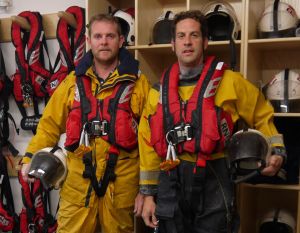Exmouth RNLI’s new lifejackets were put into practice on Saturday 6 October. Funded entirely by donations, both inshore and all-weather lifeboat designs had been delivered in August.
It took a month for the crew to familiarise themselves with the new kit before using them under emergency conditions. Each crew volunteer was individually trained and had to be able to demonstrate the correct use, repacking and maintenance of both types of lifejacket before the station could change over from the old designs.
Portland Coastguard tasked the inshore lifeboat, George Bearman at 9.59am to Orcombe Point. An 18 month-old Golden Retriever had fallen 40 foot down a cliff face and only suffered grazes, however there was further concern for the owner’s safety whilst reaching the dog. George Bearman returned to station when it became apparent both dog and owner did not require further assistance.
On a call-out, when time is of the essence and the lifeboat reaches the water in a matter of minutes, time-saving efficiency is of paramount importance. The new lifejacket designs provide increased safety for all size and shape of crew member. This improves their comfort leading to increased efficiency and effectiveness in lifesaving. Providing this safety clothing costs money, but the charity believes it owes its volunteer crews the best possible equipment and lifeboats available, as they often put themselves in difficult and dangerous situations to help others – and the public and supporters expect nothing less.
The RNLI aims to recycle every part of the old lifejackets that have now come to the end of their operational life, from steel and brass components to the fabric. This ensures the charity will generate some money to offset the cost of the new lifejackets, while the disposal is environmentally friendly.
New features of the inshore lifejackets include increased buoyancy, designed to ‘flip over’ the wearer if face down in the water. It comes complete with a bright yellow spray hood for avoiding seawater inhalation and easy detection. This model also has a ‘handle’ at the neck for retrieving crew volunteers from the water. Both designs have burst open zip pockets at the front to carry casualty care kit, torch, gloves, a knife and useful carabiners.
Don Hodgkinson, Chair of the Exmouth RNLI fundraising guild, said:
‘We’d like to thank everyone who made a donation towards these lifejackets, especially the local sailing communities and clubs who took on individual fundraising for us. Erdington branch in Birmingham also assisted with raising a large sum of money which went towards these essential pieces of life-saving kit.’


Being the crew life jackets being permanently wet by seawater what stops them being inflated automatically. Plus what happens when capsize happens ?